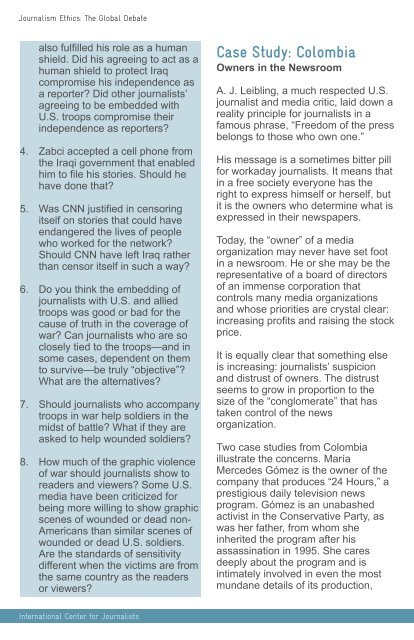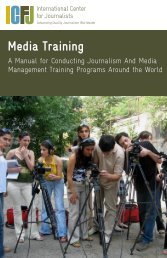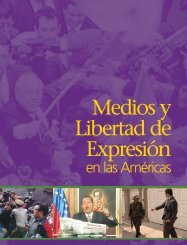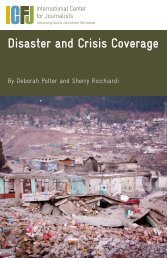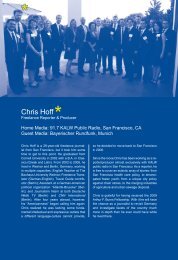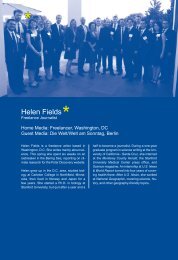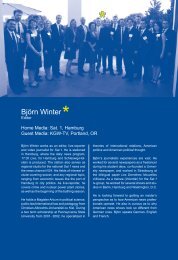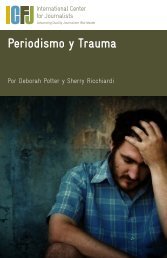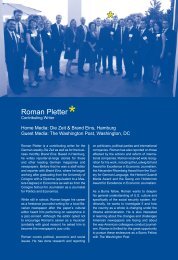Download PDF - International Center for Journalists
Download PDF - International Center for Journalists
Download PDF - International Center for Journalists
You also want an ePaper? Increase the reach of your titles
YUMPU automatically turns print PDFs into web optimized ePapers that Google loves.
Journalism Ethics: The Global Debate<br />
also fulfilled his role as a human<br />
shield. Did his agreeing to act as a<br />
human shield to protect Iraq<br />
compromise his independence as<br />
a reporter? Did other journalists’<br />
agreeing to be embedded with<br />
U.S. troops compromise their<br />
independence as reporters?<br />
4. Zabci accepted a cell phone from<br />
the Iraqi government that enabled<br />
him to file his stories. Should he<br />
have done that?<br />
5. Was CNN justified in censoring<br />
itself on stories that could have<br />
endangered the lives of people<br />
who worked <strong>for</strong> the network?<br />
Should CNN have left Iraq rather<br />
than censor itself in such a way?<br />
6. Do you think the embedding of<br />
journalists with U.S. and allied<br />
troops was good or bad <strong>for</strong> the<br />
cause of truth in the coverage of<br />
war? Can journalists who are so<br />
closely tied to the troops—and in<br />
some cases, dependent on them<br />
to survive—be truly “objective”?<br />
What are the alternatives?<br />
7. Should journalists who accompany<br />
troops in war help soldiers in the<br />
midst of battle? What if they are<br />
asked to help wounded soldiers?<br />
8. How much of the graphic violence<br />
of war should journalists show to<br />
readers and viewers? Some U.S.<br />
media have been criticized <strong>for</strong><br />
being more willing to show graphic<br />
scenes of wounded or dead non-<br />
Americans than similar scenes of<br />
wounded or dead U.S. soldiers.<br />
Are the standards of sensitivity<br />
different when the victims are from<br />
the same country as the readers<br />
or viewers?<br />
Case Study: Colombia<br />
Owners in the Newsroom<br />
A. J. Leibling, a much respected U.S.<br />
journalist and media critic, laid down a<br />
reality principle <strong>for</strong> journalists in a<br />
famous phrase, “Freedom of the press<br />
belongs to those who own one.”<br />
His message is a sometimes bitter pill<br />
<strong>for</strong> workaday journalists. It means that<br />
in a free society everyone has the<br />
right to express himself or herself, but<br />
it is the owners who determine what is<br />
expressed in their newspapers.<br />
Today, the “owner” of a media<br />
organization may never have set foot<br />
in a newsroom. He or she may be the<br />
representative of a board of directors<br />
of an immense corporation that<br />
controls many media organizations<br />
and whose priorities are crystal clear:<br />
increasing profits and raising the stock<br />
price.<br />
It is equally clear that something else<br />
is increasing: journalists’ suspicion<br />
and distrust of owners. The distrust<br />
seems to grow in proportion to the<br />
size of the “conglomerate” that has<br />
taken control of the news<br />
organization.<br />
Two case studies from Colombia<br />
illustrate the concerns. María<br />
Mercedes Gómez is the owner of the<br />
company that produces “24 Hours,” a<br />
prestigious daily television news<br />
program. Gómez is an unabashed<br />
activist in the Conservative Party, as<br />
was her father, from whom she<br />
inherited the program after his<br />
assassination in 1995. She cares<br />
deeply about the program and is<br />
intimately involved in even the most<br />
mundane details of its production,<br />
<strong>International</strong> <strong>Center</strong> <strong>for</strong> <strong>Journalists</strong>


